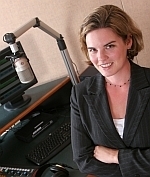 Clinical Psychologist Polly Young-Eisendrath says today’s children are
Clinical Psychologist Polly Young-Eisendrath says today’s children are
being raised to think every one of them is special – a winner with the
potential to be great. And she says that’s actually causing more harm
than good. In her new book, "The Self-Esteem Trap", Young-Eisendrath
describes "the freedom of being ordinary" and prescribes a new approach
to raising children. Share your thoughts by writing to us at
vermontedition@vpr.net.
Also, reporter Candace Page of the Burlington Free Press brings us up to
date on the latest difficulties at the big composting operation at
Burlington’s Intervale. The discovery of tiny amounts of a small
cancer-causing substance is raising questions about what standards
should apply to compost.
Comments from listeners:
Nina:
I’m a graduate student at UVM and also work with
undergraduate students. I see the self-esteem trap in action
everyday. The obsession with self and the confusing mixed messages that
young people are fed through parents, school, community, and the media can end
up being paralytic, as we struggle constantly to try to figure out if we are
superior (or inferior) to everyone else.
Instead of meeting ourselves where we’re at and freely acting in the world we
are caught up in and encumbered by self-obsession, comparison, and feeling like
we’re somehow not ok the way we are. We either feel guilty and inferior
because we should be better (because we’ve been told that we’re capable of
being the best!) or we feel weirdly better than everyone else and spend immense
amounts of energy trying to uphold this sense of superior self. It’s
pretty hard to get anything done when one is so self-conscious. And it’s
very isolating.
Granted, this process of super-ego development is a normal part of growing up,
but it’s been greatly distorted by a combination of unrealistic expectations,
junk praise, and unnecessary competition driven by the above influences.
Being aware of the self-esteem trap phenomenon has been greatly
liberating.
Jack in Montpelier:
I agree that over-praising is detrimental, and that
kids should be instilled with a realistic, somewhat modest sense of self.
But there seems to already exist a contradiction between the emphasis on
equality in the early grades of public schools and the fact that as children
become adults, they learn that our society and economic system is based on
every man for himself/survival of the fittest. How do we reconcile these
two very different viewpoints?
Paul in Bridport:
Self esteem is a delicate thing. I see all around me what raw chutzpa
can do. Bluster and especially raw confidence and a strong ego can carry a
person far. In fact, I think it’s essential to success in any job with a
political component at any level. We are attracted to those who display (ooze)
confidence. Yet, confidence alone reminds me of the poorly mounted fuel gage in
a car that can be turned to indicate more fuel in the tank with no
relationship to what’s really there.
Sarah from Brattleboro:
I remember in 1st grade (about 1991) in Bellows
Falls, VT, the teacher oriented
us to fire drills. I remember her, very directly, telling us not to help
one another in an emergency. That makes sense for 6-year-olds, but what
she said was, "Who is the most important person in the whole world?" We all
waited, confused. With my strongly religious family, my best guess was Jesus,
but that didn’t make any sense. "YOU are the most important person in the
world!" I remember the sense of
disorientation while I swallowed that statement!
Sara:
How about having a feeling of both superiority and inferiority, back and
forth? I think I grow up seeing others overly praised and see my parents
boasting about my siblings and myself. I felt that my parents
were avoiding or didn’t see my weakness and I therefore tried to hide those weaknesses. I think we need to learn how to
teach our kids to face truth.